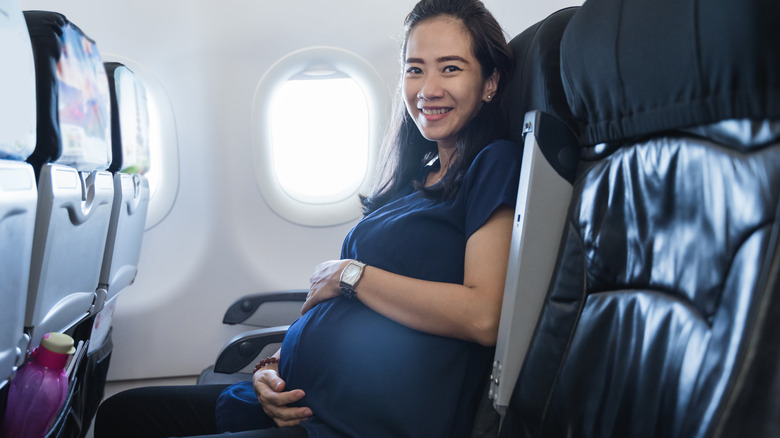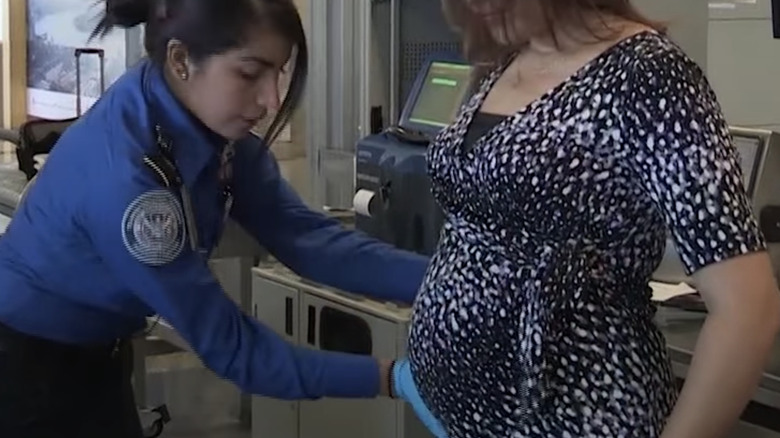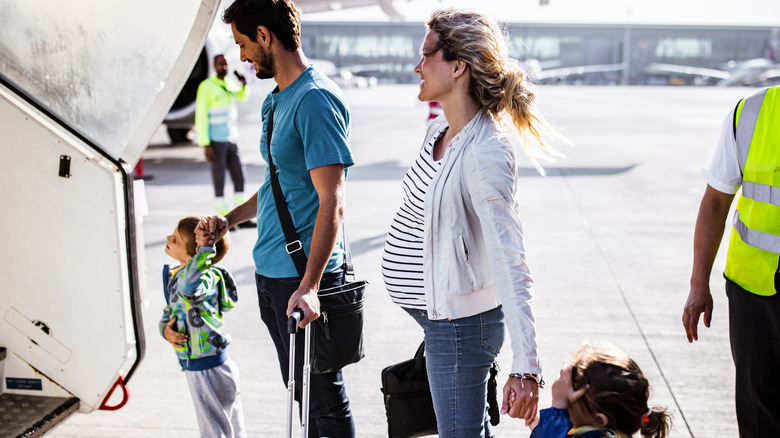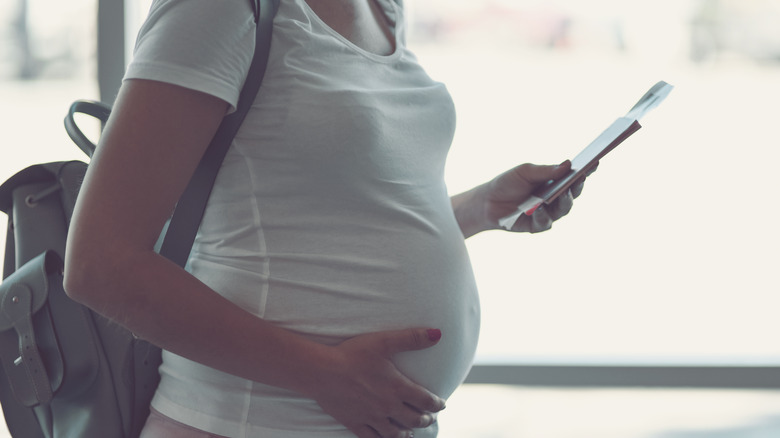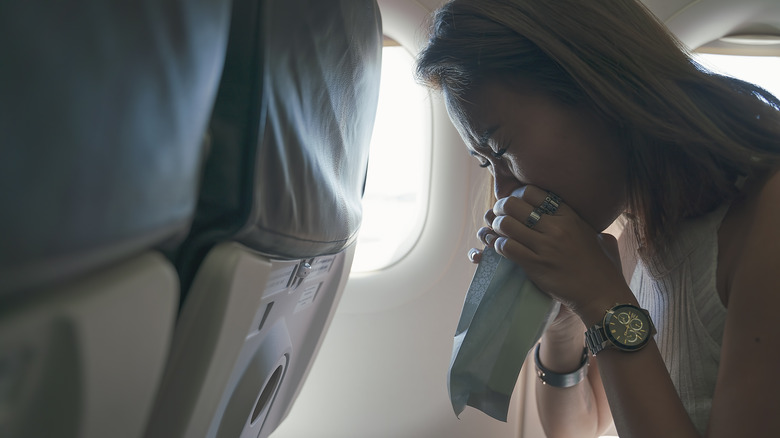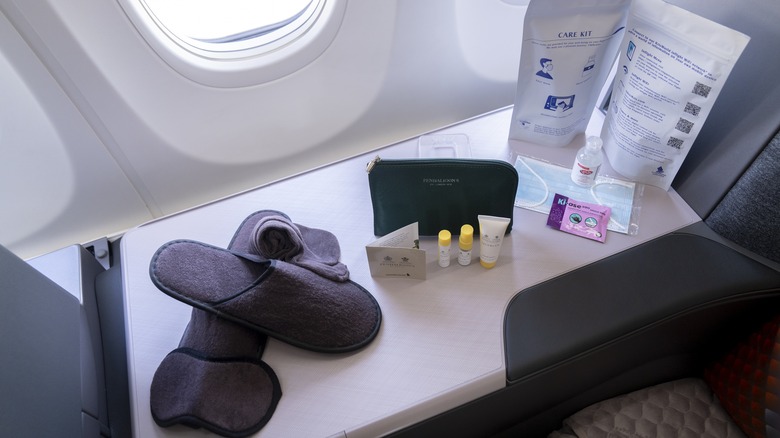What To Know About Rights As A Pregnant Airline Passenger
When it comes to traveling with an extra passenger in "uter-tow," there's a lot that passengers need to be aware of. With airlines cracking down more and more on what passengers can or cannot do on an aircraft, it's vital that you know your rights as a pregnant passenger before you take to the skies.
There are some more obvious pieces of advice, like pre-boarding if needed, as well as some lesser-considered advice, like needing health certificates in order to fly. Particularly if you've never flown as a pregnant person, these are essential tips — especially since you aren't allowed to fly at a certain point in your pregnancy unless you have the okay from a doctor.
Never forget that if you are traveling for work, you can always refuse to fly. Business-minded folks sometimes forget that pregnancy is a life-altering situation long before the baby enters the world. So if you aren't comfortable flying, or if flying is just a really uncomfortable time for you, feel free to use that magic word.
You can opt out of TSA scanners
The TSA assures pregnant passengers that whole-body scanners are safe for fetuses. These security scanners do not use X-ray technology, so you don't need to be overly cautious when approaching them. All the same, many pregnant folks aren't comfortable using them, and that's totally okay — you do not have to go into a scanner. You can always opt out and ask for a pat-down instead.
Regular metal detectors and handheld scanners at airports are also safe for pregnant people to use as well. You can still ask for a physical pat-down instead of these options too. Don't forget that you can ask for privacy if you're uncomfortable doing the pat-down in public. Although TSA can be intimidating, the staff do want you to be as comfortable as you can be, particularly if you're doing what you think is best for your mini fellow traveler.
Pre-board if you need more time
When planes begin boarding, the pre-boarding announcement for folks who need more time to get to their seats can apply to you as a pregnant passenger. Feel free to pre-board if you need some extra time to settle in. Or you could board at the last minute to let yourself walk around as much as possible to reduce any leg swelling.
Remember that unless you have small children with you, you may not be able to pre-board with your partner. You may be able to pre-board with your partner; however, most airlines will only let the individual who needs the pre-boarding accommodation board unless they need that second individual to come along.
Pre-boarding is also a good idea if you are alone and may need assistance with your carry-on luggage. Your ever-attentive flight crew will be happy to help hoist a bag into the overhead bin or help get you comfortably seated. The rush to get your stuff stowed and be seated during boarding is hectic enough without considering a pregnant belly and the restrictions it brings.
Most airlines allow up to 36 weeks of gestation
Every airline can have its own standard for when pregnant women are no longer permitted to fly or need medical clearance before doing so. However, the general rule of thumb is up to 36 weeks pregnant. Passengers over 36 weeks pregnant could risk adverse effects if they fly too far into their pregnancy.
Not every pregnant person is cleared to fly at every stage of pregnancy, either. If you have any medical conditions that are exacerbated by flying, it's a good idea to try and avoid air travel during your pregnancy for your safety as well as that of your fetus(es). Avoiding air travel is particularly important for anyone with a history of pregnancy-induced blood pressure issues.
When flying, regardless of how far along you are, you also want to try and keep your seatbelt on at all times. Because turbulence is unpredictable, it's better to be safe than sorry with a tagalong passenger. To safely wear the belt, you want it below your belly.
You may need documentation
Although the general rule is to allow passengers up to 36 weeks pregnant for single babies and 32 weeks for multiples, they will likely need proper documentation. To be on the safe side, you should bring proof of your gestational age any time you travel. Let's be honest: It can be really difficult, if not impossible, to pinpoint the pregnancy range of a stranger.
When you're in your last trimester of pregnancy, you're going to need a medical information form (MEDIF) in order to fly. This document can be obtained within 10 days of your flight and submitted to your airline before flying. Give your airline at least 48 hours with your document before check-in.
You can also have a Doctor's Diagnostic Statement confirming that you are fit to fly before air travel. This document verifies your due date and will help prevent you from being denied boarding the aircraft or even being denied entry to another country if you are traveling internationally. Destination countries have different standards for pregnant travelers, so be sure to check with local requirements before going abroad.
Ask for what you need on board
Every pregnancy is different for everyone. Airlines will do their best to accommodate what you need for your comfort and safety on the plane. Do you need a seatbelt extender or extra sick bags? Don't be afraid to advocate for yourself when in the sky or as you board. Remember our advice about wearing the belt below your belly even if you don't think you'll need a seatbelt extender. That may change how much belt length you need.
That also extends to your fellow passengers. While you can't force anyone to help you out or do you a favor, it doesn't hurt to ask. Are you feeling more nauseous than usual and want to be closer to the bathroom? Ask your rowmate at the end if they're willing to switch places with you. Need help taking your bag out of the overhead bin or getting it up there? Ask a fellow passenger if they're able to help you. Although the internet captures some bizarre in-flight meltdowns, the average passenger is still more caring than the web gives them credit for.
You may get upgraded (but don't assume you will)
Airline status or not, pregnant folks are more likely to get upgraded when airlines are making choices about free in-flight upgrades. While this is a courtesy that can happen, don't assume it will happen for you when you fly. That said, you're more likely to get upgraded when you have a higher airline loyalty status than if you aren't part of their program at all.
If you don't want to take the chance of hoping you'll be upgraded, you can try to get an upgrade strategically. Keep an eye on seat upgrade prices which can sometimes dip after purchase, or even changing flights can offer a free or deeply discounted seat in a higher fare class.
An upgrade can also be as simple as getting a better seat. Economy plus seats, for example, do offer a bit more room than traditional economy seating. Getting moved to that part of the plane will still be more comfortable than a standard seat, so that is an upgrade even if you don't get bumped from economy to first class.
